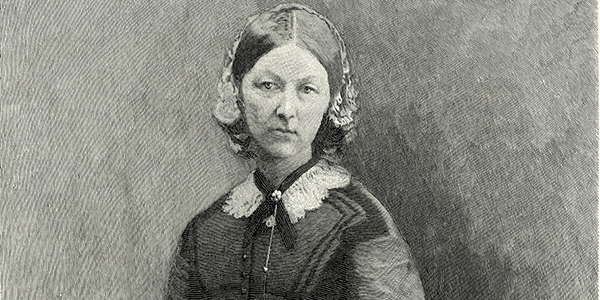
November 7, 2017, by Emma Thorne
Nightingale study to explore regional roots of The Lady with the Lamp
The Derbyshire roots of ‘The Lady with the Lamp’ are to be uncovered for the first time as part of a new £830,000 research project being led by academics at The University of Nottingham.
Funded by the Arts and Humanities Research Council, Professor Paul Crawford, of the University’s School of Health Sciences and the Institute of Mental Health and Dr Anna Greenwood in the Department of History, will be aiming to shine a light on Florence Nightingale’s unique place in the history of nursing and explore how she lived and worked in Derbyshire and across the East Midlands.
They will work with colleagues at Derby Teaching Hospitals NHS Trust, Derby University, Derwent Valley Mills World Heritage Site, Florence Nightingale Foundation and the British Library for the study.
Professor Crawford said: “The idea for the project emerged after I attended a Florence Nightingale Memorial Service, held at St Peter’s Church, Derby, and met John Rivers CBE, Chairman of the Royal Derby Hospital, who shares my fascination with nursing history. We agreed that much more could be done to raise the profile of one of Derbyshire’s greatest historical figures as a means of inspiring nurses in our region.”
Despite rich scholarship on the history of Nightingale, very little work has explored her roots in, and enduring lifelong connection to, Derbyshire and the wider East Midlands. This gap in knowledge is surprising given the ample resources available both locally and nationally for exploring this neglected aspect of her life.
The project will be the first to analyse in depth Nightingale’s long-standing connections to Derbyshire from a literary and historical perspective.
Professor Crawford added: “Florence Nightingale (1820-1910) is a unique figure in the history of nursing – almost two hundred years after her birth she remains globally significant as an inspirational figure both in nursing and for women more generally in the workplace.”
Although famously born in the Italian city after which she was named, Florence moved as a baby with her family to the East Midlands in 1821. The Nightingale family was wealthy and well connected, especially when Florence’s father, William Shore, inherited the Lea estate (and with it the right to change his surname) from his wife’s uncle, Peter Nightingale.
On their return to England, the Nightingale family had a new house built, Lea Hurst at Holloway, near Matlock in Derbyshire, where they resided until 1825 when they moved to Embley Park, Hampshire. Lea Hurst, however, remained the family’s summer home and Florence Nightingale returned there consistently throughout her childhood, teens and twenties, continuing to regularly visit throughout her long life.
During the late 1870s and early 1880s, Nightingale revisited Lea Hurst for extended periods to nurse her dying mother meanwhile undertaking charitable work in the nearby village communities of Holloway and Whatstandwell. Even once established and well-known, Nightingale invested in the region, most prominently advising Dr William Ogle in the 1860s on the redesign and management of the biggest hospital in the area, the Derby Royal Infirmary. The new hospital opened in 1869 with a wing named in Nightingale’s honour.
Although the majority of Nightingale’s professional work is strongly linked to London, her family life and connections with Derbyshire are of important in assessing the development of Nightingale’s ideas and work.
Nightingale was a prolific letter writer and often recalled her Derbyshire-based family, friends, memories and influences and the Derbyshire landscape deeply informed her conceptions of home. In one touching reminiscence from the Crimea, for example, she compared the sound of a storm to the roar of the Derwent river; in another she reflected on her desire to return to Lea Hurst if she survived the horrors of the Crimean war. But although these, and similar, allusions have been noted on a piecemeal basis, references to her enduring involvement in the area have never been systematically located and brought together for analysis.
Family fortunes and regional links
The research from this project will be the first to describe and assess the scale and colour of regional influences on Nightingale’s personality and career. This will significantly enrich Nightingale scholarship.
As well as contributing to a more nuanced biographical understanding of Nightingale, this new research perspective will additionally embed its findings within broader historical assessments of the regional importance of the Midlands or Industrial Enlightenment.
Although a product of, rather than a shaper of, this Industrial Enlightenment, Nightingale can be meaningfully understood as a descendant of these strong cultural forces. The Nightingales had a robust regional industrial pedigree. Florence’s Great Uncle, Peter Nightingale, built a successful cotton mill at Lea Bridge in 1784. This mill was later sold to Thomas Smedley (in 1818) and still operates today as well-known fine knitwear manufacturer.
Even more strikingly, Peter Nightingale had been the financier of Richard Arkwright, who —famous for the mechanisation of cotton production— was regarded as one of the fathers of the Industrial Revolution. One of his most important factory bases was located, just minutes from Nightingale’s home, at Cromford.
Florence Nightingale’s family fortunes, and therefore her opportunities, were based upon these connections to Midlands industry and, as such, provide a fascinating new platform from which to analyse her unusual attitudes and achievements.
The project will have an interactive website and hold several exhibitions and seminars locally and nationally over the next four years.
Professor Crawford and his team are keen to hear from people who may have valuable information or resources related to Florence Nightingale in Derbyshire or the wider East Midlands. As Professor Crawford added: “There is no research team bigger that the public!”
If you have information to share then please email either: paul.crawford@nottingham.ac.uk or anna.greenwood@nottingham.ac.uk
No comments yet, fill out a comment to be the first

Leave a Reply